Articles
- Page Path
- HOME > Korean J Community Nutr > Volume 17(4); 2012 > Article
-
Original Article
- Effect of Sustainability Management at Coffee Houses on Customers' Store Image and Behavioral Intention
- Joongwon Shin, Soyoung Kim, Jihyun Yoon
-
Korean Journal of Community Nutrition 2012;17(4):494-503.
DOI: https://doi.org/10.5720/kjcn.2012.17.4.494
Published online: August 31, 2012
Department of Food and Nutrition, Seoul National University, Seoul, Korea.
1Research Institute of Human Ecology, Seoul National University, Seoul, Korea.
- Corresponding author: Jihyun Yoon, Department of Food and Nutrition, Seoul National University, 1 Gwanak-ro, Gwanak-gu, Seoul 151-742, Korea. Tel: (02) 880-8750, Fax: (02) 884-0305, hoonyoon@snu.ac.kr
Copyright © 2012 The Korean Society of Community Nutrition
- 1,305 Views
- 1 Download
- 5 Crossref
Abstract
- The purpose of this study was to examine the effect of sustainability management (SM) at coffee houses on customers' store image and behavioral intention. In addition, customers' willingness to pay a premium for sustainable coffee houses was studied. During October 2011, a web survey was conducted via an on-line research company with customers aged 20 to 39 visiting one of the top five coffee houses in Korea at least once a month. A total of 300 targeted customers responded and all the data were analyzed. An exploratory factor analysis derived two dimensions of SM: SM in Social and Environmental Perspective and SM in Economic Perspective. The result of structural equation modeling indicated that SM in Economic Perspective at coffee houses had a significant positive effect on customers' behavioral intention with mediating effect by store image, but SM in Social and Environmental Perspective did not have such effect. Approximately one-third (31%) of the respondents were willing to pay a premium for a sustainable coffee house in a scenario. approximately 84% of the respondents unwilling to pay a premium for the sustainable coffee house chose the cost-related reasons including "Coffee price at the coffee house that they most often visit is already expensive (62.3%)" for such unwillingness. The results of this study showed that SM of coffee houses, especially that in Economic Perspective, could contribute to store image, and therefore increase customers' favorable behavioral intention, although the additional cost resulted from such SM practices might not be easily accommodated by customers.
- 1. Ajzen A. The theory of planned behavior. Organ Behav Hum Decis Process. 1991; 50: 179-211.Article
- 2. A Twosome Place. A Twosome Place. 2011; cited 2011 December 23. Available from http://www.twosome.co.kr.
- 3. Business Institute for Sustainable Development. A research on corporate contributions to sustainable development in 2008. 2008; cited 2011 August 15. Business Institute for Sustainable Development; Available from http://www.bisd.or.kr/.
- 4. Caribou Coffee Company. Rainforest alliance. 2011; cited 2011 August 20. Available from http://www.cariboucoffee.com/page/1/rainforest-alliance.jsp.
- 5. Chang YC, Lee MS, Kim EJ. Sustainability management of Yuhan-Kimberly. Creat & J. 2008; 1(1): 301-346.
- 6. Cho CH. Bring your mug and get 300 cash back. 2009; cited 2011 August 30. Hankookilbo; Available from http://news.hankooki.com.
- 7. Cho DS. The Institute for Industrial Policy Studies. Sustainable management. 2007; Seoul: Seoulkyungjekyungyoung.
- 8. Cranage DA, Conklin MT, Lambert CU. Effect of nutrition information in perceptions of food quality, consumption behavior and purchase intentions. J Foodserv Bus Res. 2004; 7(1): 43-61.Article
- 9. Dutta K, Umashankar V, Choi G, Parsa HG. A comparative study of consumers' green practice orientation in India and the United States: A study from the restaurant industry. J Foodserv Bus Res. 2008; 11(3): 269-285.Article
- 10. Fitzpatrick MP, Chapman GE, Barr SI. Lower-fat menu items in restaurants satisfy customers. J Am Diet Assoc. 1997; 97(5): 510-514.ArticlePubMed
- 11. Giovannucci D, Ponte S. Standards as a new form of social contract? Sustainability initiatives in the coffee industry. Food Policy. 2005; 30(3): 284-301.Article
- 12. Green Seal. GS-46 Green Seal standards for restaurants and food services. 2009; cited 2011 August 20. Available from http://www.greenseal.org.
- 13. Green Restaurant Association. Info for restauranteurs Green Restaurant Association. 2009; cited 2011 August 16. Available from http://www.dinegreen.com.
- 14. Green Restaurant Association. Green restaurant 4.0 standards. 2011; cited 2011 August 16. Available from http://www.dinegreen.com.
- 15. Global Reporting Initiative. GRI's sustainability reporting guidelines. 2011; cited 2011 August 20. Available from http://www.globalreporting.org/Reporting Framework/G31Guidelines.
- 16. Hanemann WM. Willingness to pay and willingness to accept: How much can they differ? Am Economic Rev. 1991; 81(3): 635-647.
- 17. International Facility Management Association. Sustainability "How-to guide" series : Sustainability in the food service environment. 2011; cited 2011 August 16. Available from http://www.ifmafoundation.org.
- 18. Jeon MJ. [Economics of coffee] 'The number of stores=Reliability of brand' is not the answer. Economic review. 2011; cited 2011 May 21. Available from http://er.asiae.co.kr.
- 19. Jeong EH, Jang SC. Effects of restaurant green practices: Which practices are important and effective? Caesars Hosp Res Summit. 2010; Paper 13.
- 20. KB Financial Group Inc. Monthly industry trend report June 2011. 2011; cited 2011 December 24. Available from http://www.kbfng.com/kbresearch.
- 21. Kim HB, Lee JW, Ro YJ. Impact of choices attributes on customer loyalty in the coffee-shop restaurant. J Foodserv Manage. 2007; 10(4): 237-252.
- 22. Kim YO. A study on the choice attributes and customer satisfaction of a take-out coffee shop. Korean J Culinary Res. 2003; 9(3): 141-154.
- 23. Kukminilbo. Bring your mug and get 200 cash back. 2011; cited 2011 August 30. Kuminilbo; Available from http://news.kukinews.com/.
- 24. Kunkel JH, Berry LL. A behavioral conception of retail image. J Mark. 1968; 32(4): 21-27.ArticlePDF
- 25. Loureiroa M, Lotade J. Do fair trade and eco-labels in coffee wake up the consumer conscience? Ecol Econ. 2005; 53(1): 129-138.Article
- 26. National Restaurant Association. 2009 restaurant industry forecast. 2008; cited 2011 August 13. Available from http://www.restaurant.org.
- 27. Pelsmacker P, Driesen L, Rayp G. Do consumers care about ethics? Willingness to Pay for Fair-Trade Coffee. J Consum Aff. 2005; 39(2): 363-385.Article
- 28. Rondinelli DA, Berry MA. Environmental citizenship in multinational corporations: social responsibility and sustainable development. European Management J. 2000; 18(1): 70-84.Article
- 29. Sustainable Restaurant Association. Pledge, values and charter of actions. 2010; cited 2011 August 20. Available from http://www.thesra.org.
- 30. Starbucks Coffee Korea. Shared planet. 2011; cited 2011 August 20. Available from http://www.istarbucks.co.kr/Responsibility/starbucks_shared_planet.asp.
- 31. Sustain. Serving up sustainability. 2007; cited 2011 August 14. Available from http://www.sustainweb.org.
- 32. The Korea Business Council for Sustainable Development. Framework and practical issues of sustainable management. 2004; cited 2011 August 15. Available from http://academic.naver.com.
- 33. Togridou A, Hovardas T, Pantis JD. Determinants of visitors' willingness to pay for the national marine park of Zakynthos, Greece. Ecological Economics. 2006; 60(1): 308-319.Article
- 34. Webb DJ, Mohr LA, Harris KE. A re-examination of socially responsible consumption and its measurement. J Bus Res. 2008; 61(2): 91-98.Article
- 35. World Commission on Environment and Development. Our Common Future. 1987; cited 2011 August 15. Available from http://www.un-documents.net/ocf-02.htm.
- 36. Yoon SJ. Sustainable development and energy policy for 21st century. Korean Public Adm Rev. 2002; 36(3): 147-166.
REFERENCES
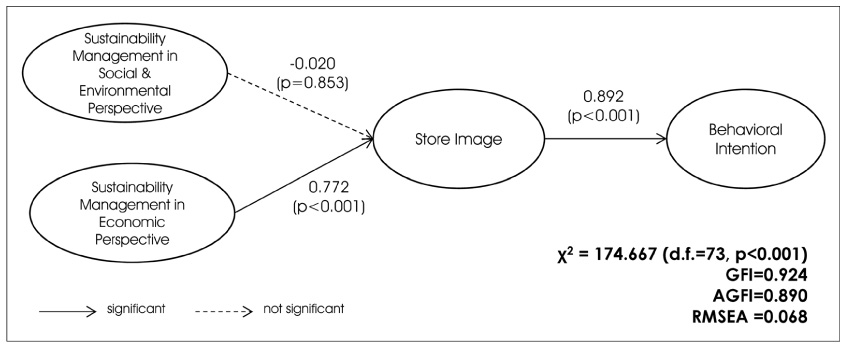
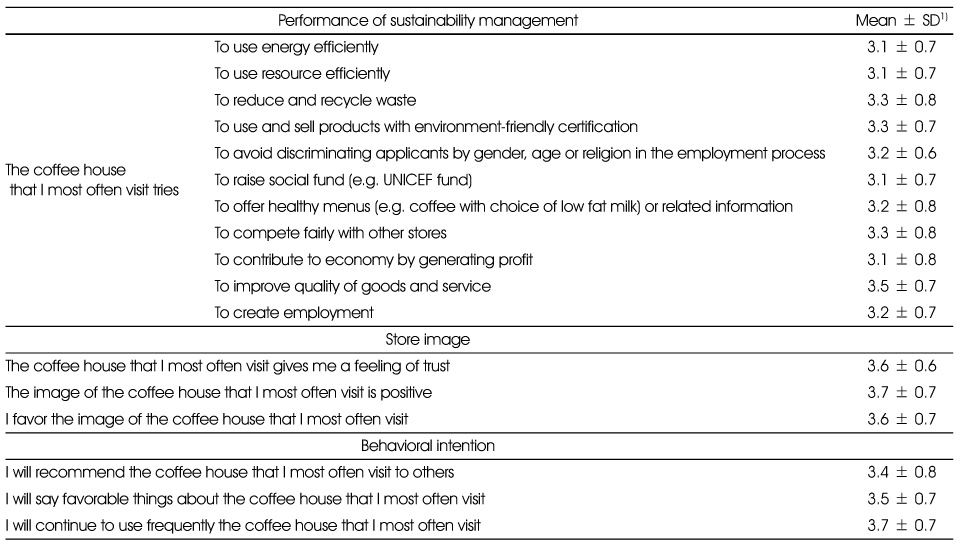
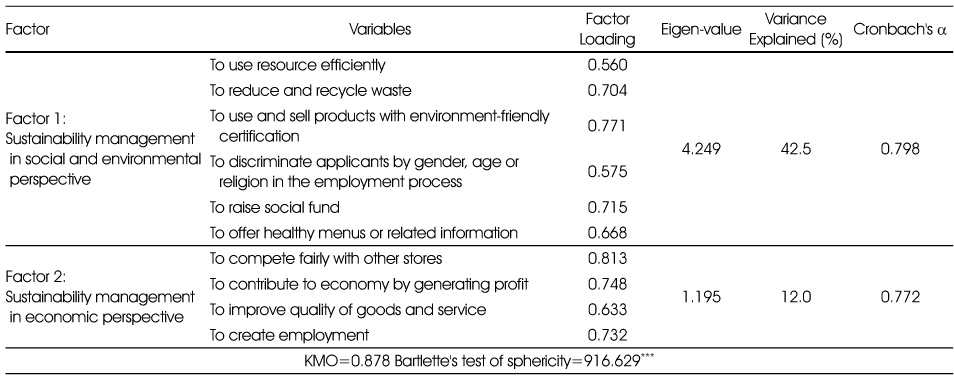
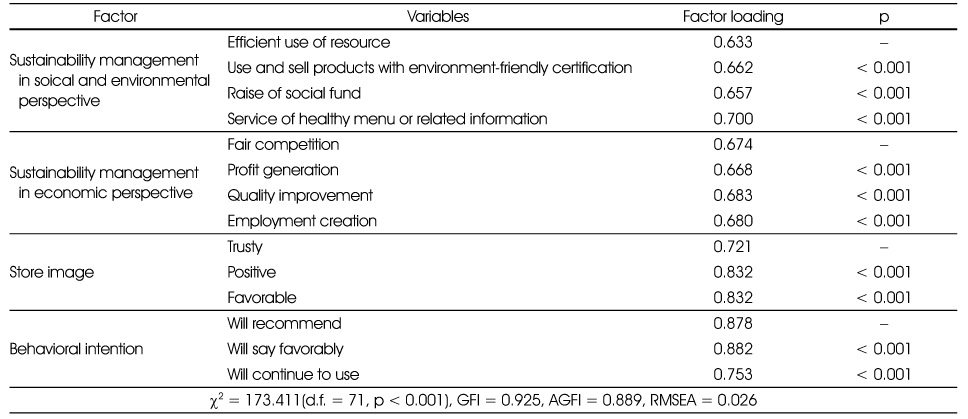
Figure & Data
REFERENCES
Citations

- Mediating Effects of Social Connectedness on the Relationship between Sustainability Management and Brand Loyalty at Coffee Specialty Shops
Na-Young Yi
Korean Journal of Food and Cookery Science.2018; 34(5): 533. CrossRef - Dietitians' Self-Evaluation and Barriers to Sustainable Practices for School Foodservice Management : Focused on Daejeon and Chungnam Area
Na-Young Yi
Korean Journal of Food & Cookery Science.2017; 33(3): 342. CrossRef - The influences of sustainability management at institutional foodservice on store image and behavioral intention
Jiyoon Ahn, Sunhee Seo
Journal of Nutrition and Health.2015; 48(2): 199. CrossRef - Relationship of TBL Component in Corporate Sustainable Management of Fashion Company with Company Evaluation and Brand Image
Dongkyu Na, Jeongwon Lee, Youngjoo Na
Fashion & Textile Research Journal.2014; 16(2): 293. CrossRef - Health-related Factors and Nutritional Status in Shift-workers at Coffee Shops - Focused on Single Women in Twenties in Seoul -
Seung-Lim Lee, Soo-Jin Kim
Korean Journal of Community Nutrition.2013; 18(5): 467. CrossRef
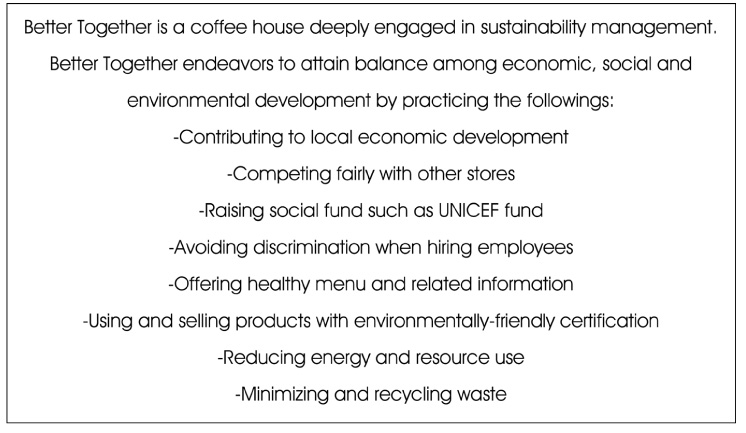

Fig. 1
Fig. 2
Responding customers' general characteristics and usage of coffee houses
Perceived performance of sustainability management, store image and behavioral intention at coffee houses (n = 300)
1) 1 = Strongly disagree, 2 = Disagree, 3 = Neither agree nor disagree, 4 = Agree, 5 = Strongly agree
Dimensions of sustainability management practices at coffee houses: Result of exploratory factor analysis (n = 300)
Validity of the measurement model for sustainability management, store image, and behavioral intention at coffee houses: Result of confirmatory factor analysis (n = 300)
Willingness to pay a premium for coffee at a sustainable coffee house in a scenario
1) Amount in addition to the price (3,500~4,000 won) of a cup of Americano coffee at the coffee house the respondent most often visits. It ranged from 100 to 2,500 won, and mean ± S.D. was 530 ± 487 won.
Reasons for willingness or unwillingness to pay a premium for sustainable coffee houses
1) 1 = Strongly disagree, 2 = Disagree, 3 = Neither agree nor disagree, 4 = Agree, 5 = Strongly agree
1) Amount in addition to the price (3,500~4,000 won) of a cup of Americano coffee at the coffee house the respondent most often visits. It ranged from 100 to 2,500 won, and mean ± S.D. was 530 ± 487 won.

 KSCN
KSCN

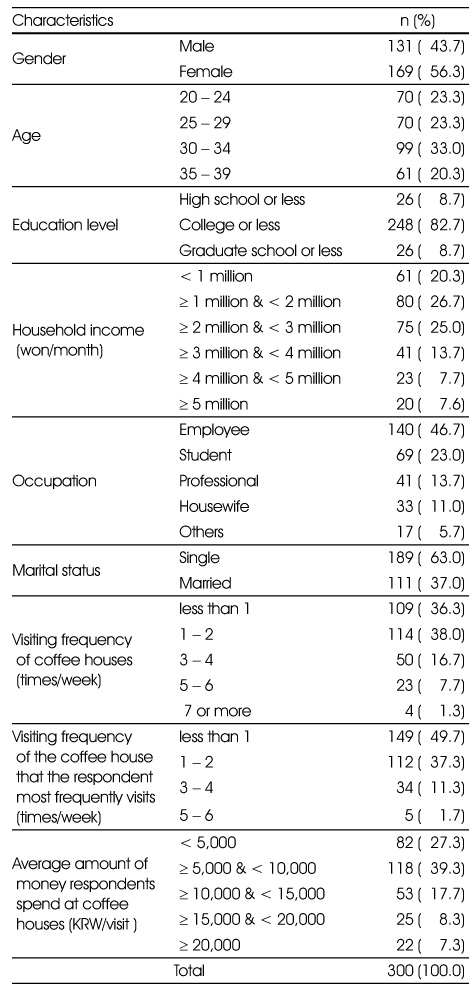

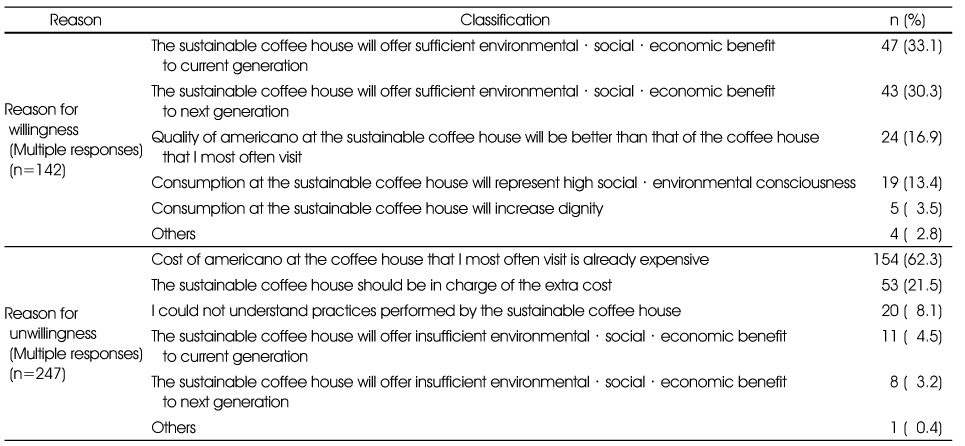
 Cite
Cite


